September 25, 2016 at 1:18 pm
Tidings do I bring and lucky joys and golden times and happy news of price. Benvolio, Malvolio, and many between have averted a second tragedy with the discovery of another First Folio, in time for the bards 400th year anniversary. It was found on
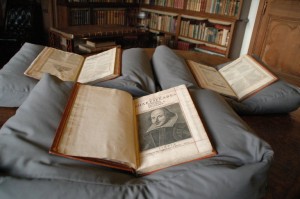
“The newly discovered Shakespeare First Folio is bound in three volumes. Credit Mount Stuart.” Illustration for The New York Times
the Island of Bute, and authenticated by Shakespeare expert and enthusiast Emma Smith at the University of Oxford. It’s significance is therefore best expressed in her own words:
“Finding it right now is almost crazy,” said Emma Smith…discovering a new First Folio, she added, “is like spotting a panda.”
Between quotations is Jennifer Schuessler of The New York Times, who is paraphrased in the first line. Happy news of price?
The copy in Scotland was not, strictly speaking, totally unknown. It had been listed in the typed catalog of theButefamilylibrary as early as 1896, but its existence seems never to have been made public, even after a census of First Folios in 1902 by the scholar Sidney Lee led more than one millionaire to complain that his prize treasure had not been listed.
Mount Stuart, which is owned by a charitable trust, has recently been trying to assemble a full catalog of its substantial library and art collection, both to attract visitors and to make the holdings accessible to researchers. Alice Martin, the director of collections, said she had pulled the Folio, which is bound in three separate volumes, off the shelf at some point last year.
First Folios are among the worlds most sought-after and valuable books. Christiesrecently announcedthat it was selling what it calls a previously unrecorded First Folio from a discreet and off-the-radar private collection, valued at $1.1 million to $1.7 million.
We, andHamlet, can sympathize with Emma Smith when she says that Shakespeare has a way of driving us toward the brink of insanity. It is debatable though whether the pleasures of reading himare as great as thosehe must have felt while writing, and thereafter: Immortality, millionaire status, and a mansion for a home at Mount Stuart.
Read her full post at The New York Times
By Kush Ganatra
|
Posted in Great Books, In the News
|
September 22, 2016 at 4:53 pm
For several reasons, Philosophy departments in the United States have traditionally recommended a safe distance from Nietzsche.
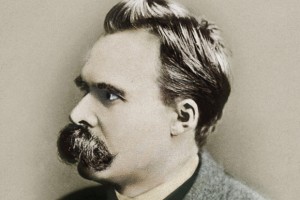
Illustration for The Spectator
One is the prose style, which shows a penchant less for analysis and more for Dionysus. Another is hygiene: the charge of anti-Semitism has stuck to him like a bad scent, despite the attempts by expositors, most notably Walter Kauffman, to scour his reputation. The latest attempt comes from Daniel Blues, in his detergent The Making of Friedrich Nietzsche, reviewed by Christopher Bray of The Spectator. Bray asks:
But does Blue offer as radically new a portrait of Nietzsche as he claims? On the whole, Im afraid, no. In essence, what this book does is translate into biographical terms the more analytical findings of Walter Kaufmann's still groundbreaking studyNietzsche: Philosopher, Psychologist, Antichrist. Prior to the publication of that book in 1950, it was a critical commonplace that Nietzsche was a crazed Teutonic supremacist whose poetic ranting was of no philosophical worth. Kaufmann went back to the original texts to show how, far from being a proto-dictator, Nietzsche (who once called himself the lastanti-politicalGerman) was in fact a proto-existentialist a rationalist moralist who believed that the only thing worth conquering was the self.
But does Blue claim to offer a radically new portrait of Nietzsche? On the whole, I'm afraid, Bray does not quote Blue as telling us so. Where else does Blue go wrong?
Nietzsche isnt just the greatest stylist in the history of philosophy. Hes one of the greatest stylists in the history of the written word. As with Shakespeare, reading Nietzsche is like reading a dictionary of quotations: practically every line seems both familiar and startling.
Which means that the big drawback of Blues impressively researched book is its prose.
That is a familiar and startling leap. Cutting out the middleman may be cheap, but bad for ones argument. Does it follow that because Nietzsche writes glittering prose that Blue is obliged to use it as a standard for his own? I do not think he means to say so, but it does then impugn the "which means," which means that it is not being used honorably but as a lubricant on which we must let the writer slip without doing so ourselves. Familiar and startling, these tactics: remember Petrarch, Rousseau, Montaigne...Nietzsche?
Read his review at The Spectator
By Kush Ganatra
|
Posted in Uncategorized
|
September 17, 2016 at 2:30 pm
"No, the Internet Has Not Killed the Printed Book. Most People Still Prefer Them," Daniel Victor of the New York Times assures us in the title of his latest. And also invites us to ponder whether the slip in grammar might not indicate that the Internet has killed or made moribund something else: literacy. Citing a Pew Research study, he writes:
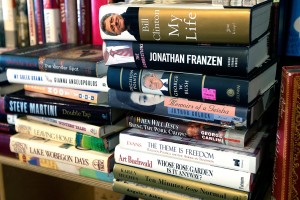
"Books line the walls on at Common Grounds, in DeKalb, Ill., in August." Image for The New York Times by Katie Smith/Daily Chronicle, via Associated Press
Sixty-five percent of adults in the United States said they had read a printed book in the past year, the same percentage that said so in 2012. When you add in ebooks and audiobooks, the number that said they had read a book in printed or electronic format in the past 12 months rose to 73 percent, compared with 74 percent in 2012.
And adds that:
People are indeed using tablets and smartphones to read books. Thirteen percent of adults in the United States said that they used their cellphones for reading in the past year, up from 5 percent in 2011.
It might also be worthwhile to consider (taking a look at the stacks to your right) whether the quality in books that are being popularly read has undergone some kind of decline. Are books that are increasingly coming to take from in tablets and smartphones less likely to be smart books? In the hurly-burly of the here and now, it is nice that there remain nooks (no the other kind) and corners, such as The Core, reminding us of the literature that keeps us from being enslaved by the present, and teaches good writing in the meanwhile.
Read the full post at The New York Times.
By Kush Ganatra
|
Posted in Future of the Book, Uncategorized
|
Tagged books, internet, modernity, reading, writing
|
September 15, 2016 at 11:54 am
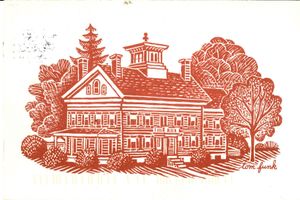
We have just received word back from recent Core/BU alum Justin Lievano (CAS '16). He sends us his regards from the Dickinson house in Amherst, to which he made a pilgrimage. He writes:

16 Sept. 2016
Dear Core,
Good news! I have secured a position with a florist in Greenwich, CT. (McArdle's if you're curious) This card comes from recent visit to the Dickinson house in Amherst. I hope you lovely people are all well! I will visit--as soon as I can.
Best always,
Justin L.
* Corelovespostcards. Whether youre at home or abroad now, wed love to get one from you. Our address is easy: Core Curriculum, Boston University, Boston MA 02215.
By cdossett
|
Posted in Postcards
|
Tagged postcard
|
September 13, 2016 at 3:00 pm
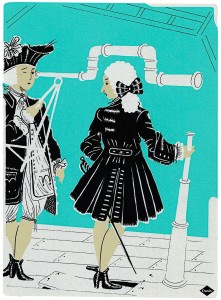
"During the Enlightenment, every fixed point of knowledge began to wobble." Illustration for The New Yorker by Brian Cronin.
Down in New York, reviewing the new book The Dream of Enlightenment by Anthony Gottlieb, critic and poet Adam Kirsch has penned a longand wide-ranging essay that considers our modern moment. Are we really as alienated from history in the year 2016, and as disrupted by technology from our cultural forebears, as it is sometimes fashion to profess? Kirsch thinks not; "Modernity cannot be identified with any particular technological or social breakthrough. Rather, it is a subjective condition, a feeling or an intuition that we are in some profound sense different from the people who lived before us." He writes:
If we are looking for the real origins of the modern world, then, we have to look for the moment when that world was literally disoriented--stripped of its sense of direction. Heliocentrism, the doctrine that the earth revolves around the sun rather than vice versa, was announced by Copernicus in 1543 and championed by Galileo in the early sixteen-hundreds. This revelation was immediately experienced as a profound dislocation, as John Donne testified in his 1611 poem An Anatomy of the World: The sun is lost, and the earth, and no mans wit / Can well direct him where to look for it. More than two hundred and fifty years later, Nietzsche was reeling from the same cosmic loss of direction: What were we doing when we unchained this earth from its sun? . . . Are we not plunging continually? Backward, sideward, forward, in all directions? Is there still any up or down? Modernity is a vertigo that began in the sixteenth century and shows no sign of letting up.
(Emphasis added.)
Over the course of his review, Kirsch manages to reference Donne, Copernicus, Leibniz, Nietzsche, Newton, Spinoza, Hume, and a dozen and more other major thinkers, spelling out the marquee authors of a syllabus that is more of less Core-like in nature. How cheering to think that these authors, so long ago alive and active, remain relevant even now, centuries from their time... but then, that's the Core concept, isn't it? These are the books of the ever-present tradition.
Read his full essay online at The New Yorker.
By zakbos
|
Posted in Great Books, Great Ideas, Other Publications
|
Tagged Book Review, Donne, Enlightenment, Hume, Newton, Nietzsche, Spinoza
|
August 31, 2016 at 11:19 am
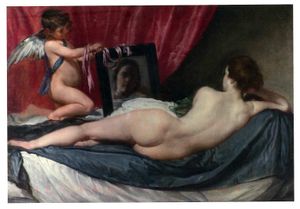
And here's another from our summer postcard crop. This one comes to CAS 119 from London, where Giselle Boustani spent some guide times during her long break. She writes:
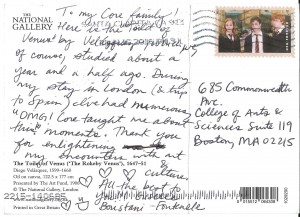
To my Core family!
Here is the "Toilet of Venus" by Velázquez, which we, of course, studied about a year and a half ago. During my stay in London (& trip to Spain) I've had numerous "OMG! Core taught me about this!" moments. Thank you for enlightening my encounter with art & culture.
All the best to you,
Giselle Boustani-Fontenelle
Daw! Thank YOU, Giselle, for enriching our Core community -- through classroom discussion, through your gregarious manner and good conversation, and all the rest.
*
Core loves postcards. Whether you’re at home or abroad now, we’d love to get one from you. Our address is easy: Core Curriculum, Boston University, Boston MA 02215.
By CAS Core Curriculum
|
Posted in Postcards
|
Tagged Art, art history, London, museum, painting, postcard, Spain, Velázquez
|
August 27, 2016 at 7:36 pm

From http://www.bbc.com/culture/story/20160822-the-mysterious-ancient-origins-of-the-book:
The book is changing. Electronic books, or ebooks, are more portable than their paper counterparts, capable of being carried in their hundreds on a single reader or tablet. Thousands more are just a click away. It can be argued that ebooks are more robust than paper ones: an ebook reader can be stolen or dropped in the bath, but the books on it are stored safely in the cloud, waiting to be downloaded onto a new device. It is not too much to say that books and reading are in the throes of a revolution . . .
Read the full article at the BBC website. A tip of the hat to Prof. Hamill for bringing this article to our attention.
The graphic at top comes from the History of the Book webpage, hosted by Harvard University. Click here to visit that resource page, and, if book history is something you would like to learn more about, consider signing up for Harvard's History of the Book mailing list for Boston-area events.
By zakbos
|
Posted in Great Books, Other Publications
|
Tagged books, history
|
August 1, 2016 at 11:15 am
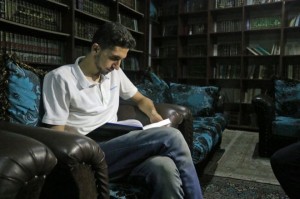
Erin Rubin (Core '08, CAS '10) brings to our attention this article at the BBC website, about "Syria's secret library":
When a place has been besieged for years and hunger stalks the streets, you might have thought people would have little interest in books. But enthusiasts have stocked an underground library in Syria with volumes rescued from bombed buildings - and users dodge shells and bullets to reach it.
Erin writes:
Books provide hope and humanity in the midst of unimaginable devastation. Imagine how precious books must be to this group for them to go to such lengths to create a library when food and medical care are in short supply. Just one more thing we at BU can take for granted – the almost embarrassing wealth of books at our immediate disposal.
Read the full piece here at the BBC.
By zakbos
|
Posted in Uncategorized
|
Tagged books, current events
|
July 30, 2016 at 10:48 am
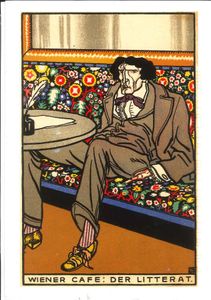
We got mail! This time it manifests in the form of a postcard from our very own Professor Kyna Hamill, who writes to us from New York. Here's what she has to say:
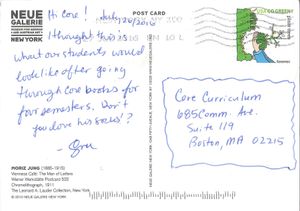
July 26, 2016
Hi Core!
I thought this is what our students would look like after going through Core books for four semesters. Don't you love his socks!?
- Kyna
(We do indeed.)
* Core loves postcards. Whether you're at home or abroad now, we'd love to get one from you. Our address is easy: Core Curriculum, Boston University, Boston MA 02215.
By cdossett
|
Posted in Postcards
|
Tagged postcards
|
July 20, 2016 at 11:33 am

Our latest postcard has flown into Core from peninsular Italy, specifically the ancient walled city of Urbino. It was sent by Prof. Gabrielle Sims, who as an Italianist writing from Italy unsurprisingly opened her note with an Italian greeting:
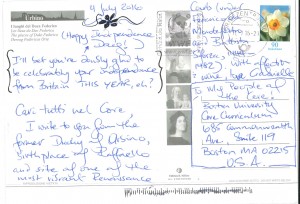 Cari tutti nel Core ["Dear everyone in Core"],
Cari tutti nel Core ["Dear everyone in Core"],
I write to you from the former Duchy or Urbino, birthplace of Raffaello and site of one of the most vibrant Renaissance courts (under Federico da Montefeltro and Battista Sforza, 1444-1482).
Happy Independence Day! I'll bet you're doubly glad to be celebrating your independence from Britain THIS year, eh?
With affection & wine, love to my people of the Core!
Gabrielle
*
Core loves postcards. Whether you’re at home or abroad now, we’d love to get one from you. Our address is easy: Core Curriculum, Boston University, Boston MA 02215.
By zakbos
|
Posted in Postcards
|
Tagged faculty, Italy, postcard, Sims
|














